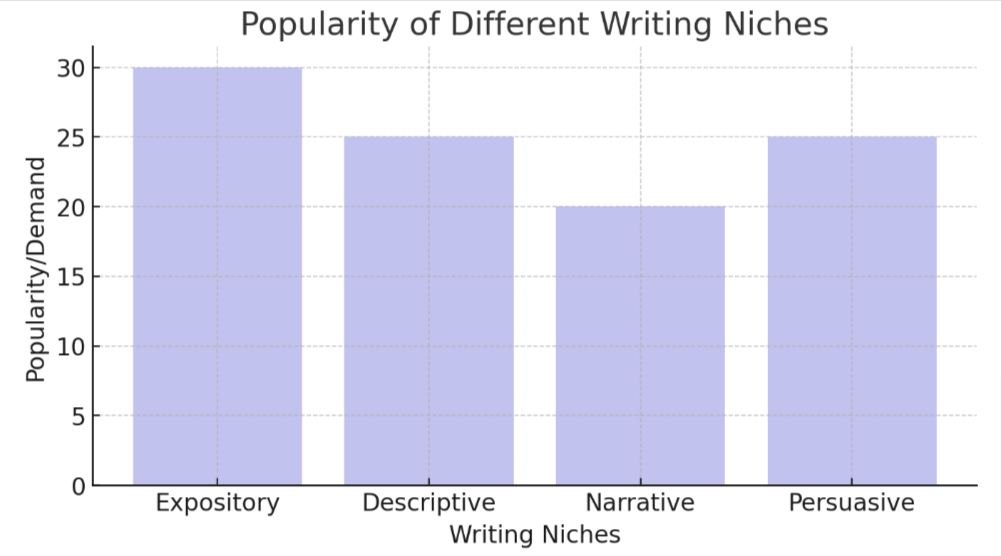Carving Out Your Specialty in the World of Review Writing
Struggling to stand out in the world of review writing? It’s a crowded market, but finding your niche can make all the difference. This article will guide you through discovering your unique angle and becoming a go-to expert for readers.
Let’s dive into carving out your own space!
Key Takeaways
- A writing niche allows you to specialize in a specific area, making you an expert and helping you stand out to readers.
- Different niches in review writing include expository, descriptive, narrative, and persuasive styles; each requires a particular set of skills.
- To determine your niche, assess personal interests and strengths, identify market demands and opportunities, and consider earning potential within the field.
- Expertise in your niche leads to credibility as a reviewer and creates opportunities for monetization through targeted audience engagement.
- Starting the journey to find your review writing niche involves researching trends, experimenting with different topics, setting realistic goals, and staying committed.
Understanding the Importance of Having a Writing Niche
Having a writing niche allows you to specialize and stand out in a crowded market, leading to better opportunities for success. It also helps you build authority and expertise in your chosen area of focus.
What is a writing niche?
A writing niche is a specialized area where a writer has extensive knowledge or a unique perspective to offer. It could be anything from travel reviews to tech gadgets, where the content creator delves deep into one specific subject.
By focusing on this particular field, writers can become go-to experts for readers seeking trusted information and opinions.
Choosing a niche helps in connecting with a targeted audience that shares similar interests. Whether it’s reviewing movies, books, restaurants, or products, sticking to one lane allows freelance writers to hone their skills in that genre.
This specialization makes it easier for writers to stand out in the crowded world of content creation and potentially leads to more consistent work and opportunities.
The benefits of having a niche
Understanding what a writing niche is sets the stage for appreciating its advantages. Having a niche can propel your writing career forward by giving you focus and direction. Specializing as a writer allows you to hone your skills in one area, making you an expert in that field.
This level of content expertise attracts a targeted audience searching specifically for the information or stories you provide.
By carving out a unique perspective within your specialized writing, you stand out from competitors who cover broader topics. A defined niche also opens up market opportunities, as readers and businesses often look for writers with specific subject matter expertise.
This not just boosts your credibility but can lead to better paying gigs and a stronger professional reputation in the freelance writing focus arena.
Exploring Different Writing Niches
Expository, descriptive, narrative, and persuasive writing are just a few of the different niches that writers can explore. Each niche offers its own unique opportunities for expression and engagement with readers.

Expository writing
Expository writing shines a spotlight on facts. It’s all about clarity and presenting information in a straightforward way, helping readers understand your topic without the frills of storytelling or persuasion.
Authors use this style to explain how things work, convey data, and provide instructions. This approach suits niche areas where educating the reader is key. Think medical guides, tech manuals, or financial reports – these are prime territories for expository content creation.
Crafting expository pieces means becoming an expert at breaking down complex ideas into digestible chunks. A successful writer in this field knows their subject matter inside out and can pinpoint their specialized audience’s needs.
They turn complicated concepts into accessible knowledge without losing depth or accuracy—a balancing act that requires sharp writing skills and a clear understanding of the target audience’s questions and challenges.
Descriptive writing
Descriptive writing vividly portrays a person, place, or thing in such detail that the reader forms a mental image. It uses sensory details and adjectives to create a clear picture in the reader’s mind, evoking emotions and immersing them into the scene.
This type of writing allows for creativity and expression through language and appeals to readers who enjoy visualizing stories.
Engaging in descriptive writing can help you develop your skills as a writer by enhancing your ability to paint detailed pictures with words. By refining your descriptive writing abilities, you can cultivate a strong connection with readers who appreciate colorful and expressive narratives – ultimately expanding your potential audience.
Narrative writing
Narrative writing tells a story or recounts events. It conveys experiences through a chronological sequence of events, characterized by characters, dialogue, and vivid descriptions.
In this niche, writers engage readers by crafting compelling narratives that draw them into the story. They use their creativity to evoke emotions and transport readers to different places and times.
Narrative writing is often used in fiction novels, short stories, memoirs, and personal essays.
Persuasive writing
Crafting persuasive writing involves presenting a compelling argument and influencing the reader’s viewpoint. This style of writing aims to convince the audience through strong reasoning, emotional appeals, and credible evidence.
By leveraging persuasive language, writers can sway their readers toward a particular perspective or course of action.
Effective persuasive writing captures the reader’s attention from the outset with a clear and concise thesis statement that encapsulates the main argument. It then proceeds to provide supporting evidence while acknowledging counterarguments to strengthen its position and foster critical thinking in the audience.
How to Determine Your Writing Niche
Assess your strengths and interests, identify market opportunities, and consider earning potential to determine the best writing niche for you. If you’re ready to take your review writing to the next level, read on to find out how to narrow down your focus and stand out in the crowded content landscape.
Assessing your strengths and interests
Identify your writing strengths and interests by reflecting on which topics or styles you naturally excel at and find enjoyable. Consider the subjects that you are passionate about and have extensive knowledge in, as this will make it easier to produce high-quality content.
Furthermore, evaluate your expertise in specific genres such as technology, fashion, or food. This assessment ensures that your chosen niche aligns with your skills and enthusiasm.
Explore potential niche opportunities based on market demand and relevance to target audiences. By researching current trends and audience preferences, you can identify areas where there is a need for specialized review writing.
Identifying market opportunities
After assessing your strengths and interests, it’s essential to identify market opportunities for review writing. Start by researching popular products or services that are currently in demand.
Analyze the consumer trends and preferences within your niche, enabling you to tailor your reviews effectively. Additionally, consider exploring potential collaborations with brands or companies seeking authentic and insightful reviews.
By identifying these market opportunities, you can strategically position yourself as a valuable resource for both consumers and businesses within your chosen review writing niche.
Considering earning potential
When considering your writing niche, it’s essential to factor in the earning potential. Assessing the market opportunities for review writing can help you identify areas where your expertise aligns with what audiences are willing to pay for.
By setting achievable goals and staying realistic, you can position yourself for a successful career in review writing while also maximizing your earning potential.
Identifying niche markets with high demand and combining them with your unique perspective can lead to increased opportunities for monetizing your review writing skills. Additionally, understanding the target audience and recognizing specialized niches within review writing can further enhance your earning potential as a freelance writer specializing in reviews.
Finding Your Niche in Review Writing
Identify your expertise and unique perspective to stand out in the review writing space. Explore your passions and interests, assess the market for review writing, set achievable goals, and stay realistic.

Identifying your expertise and unique perspective
To find your niche in review writing, evaluate your expertise and distinctive viewpoint. Consider your passion and interests as they play a crucial role in defining your unique voice.
Assess the market for review writing, examining the demand for different types of reviews to identify potential opportunities that align with your expertise. Set realistic goals based on the evaluation of your strengths and weaknesses, ensuring that you establish a clear pathway towards establishing yourself as an authority in this specialized field.
By honing in on your specific area of expertise and developing a distinct perspective, you can differentiate yourself from other writers. This will enable you to effectively target audiences who are seeking content crafted from a fresh standpoint, ultimately contributing to the growth of your writing career within the domain of review writing.
Exploring your passions and interests
Having identified your expertise and unique perspective, it’s essential to explore your passions and interests when finding your niche in review writing. Assess what subjects or products you genuinely enjoy and are knowledgeable about.
Consider the areas where you can offer valuable insights and engage with an audience authentically. This involves reflecting on what excites you, what motivates you to share your thoughts, and where you see potential for growth within the review writing landscape.
Focusing on exploring your passions allows you to infuse enthusiasm into your reviews, making them more compelling for readers. It also enables you to create content that resonates with both yourself and your target audience, leading to more impactful connections in the world of review writing.
Assessing the market for review writing
After exploring your passions and interests, it’s crucial to assess the market for review writing. Research popular review topics and identify gaps in the market where you can offer unique perspectives.
Analyze competitors’ work to understand different styles and approaches. Consider what types of products or services are trending and aligning with your personal expertise as well as audience demand is essential.
Conduct keyword research using tools like Google Trends or SEMrush to understand search volume and interest around potential review topics. And keep an eye on social media platforms to gauge the engagement levels on various types of reviews within your niche.
Setting achievable goals and staying realistic
To excel in review writing, setting achievable goals and staying realistic is crucial. Begin by outlining specific objectives for your writing career, such as the number of reviews to produce monthly or the platforms where you aim to publish your work.
Determine attainable milestones that align with your expertise and interests. Avoid overwhelming yourself with unrealistic targets; instead, focus on gradual progress.
Staying realistic involves acknowledging the challenges and competition within the review writing niche while understanding your unique strengths and areas for improvement. Identify industry benchmarks but refrain from comparing yourself to others excessively.
Conclusion
Emphasize the importance of finding a niche in review writing, encourage readers to begin their search and experiment with different niches. Start your journey to discovering your review writing niche today!
Emphasize the importance of finding a niche in review writing
Finding a niche in review writing is crucial for establishing expertise and building credibility in this specific genre. By honing in on a particular area of interest or expertise, writers can provide valuable insights and unique perspectives that cater to their target audience’s needs.
This specialized focus not only sets them apart from generic reviewers but also allows them to create content that resonates deeply with their readers. Additionally, having a niche in review writing enables writers to delve deeper into the subject matter, develop their skills, and ultimately become an authority in their chosen area of review.
Identifying a niche provides writers with the opportunity to establish themselves as experts in specific topics or products, which can lead to increased visibility and recognition within the industry.
Encourage readers to begin their search and experiment with different niches.
Begin your exploration of different writing niches by identifying your expertise and unique perspective. Experiment with various subjects that align with your passions and interests to discover where your strengths lie.
Assess the market for review writing by researching what topics are currently in demand.
Set achievable goals and stay realistic as you delve into finding your niche in review writing. Embrace the process of discovering which niche resonates best with you, allowing yourself room to grow and adapt along the way.

